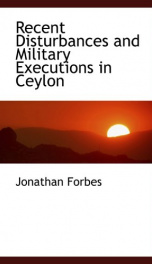recent disturbances and military executions in ceylon

Purchase of this book includes free trial access to www.million-books.com where you can read more than a million books for free. This is an OCR edition with typos. Excerpt from book: EECENT DISTURBANCES MILITARY EXECUTIONS IN CEYLON. I Shall commence by noticing the position of the various races and native inhabitants of Ceylon, who may be thus arranged: Malabars, who profess, in name of religion, some of the various forms of Hindu superstition, and occupy the northern and eastern parts of the island. Cingalese, of the maritime provinces. These, having for centuries been under European control, retain but little feeling of nationality: they profess either the Christian or Buddhist religions. The Yedahs are the aboriginal inhabitants of the country, who occupy an unfertile and unhealthy tract of the interior, next to the eastern portion of the maritime provinces. Their religion consists of degrading superstitions, which I shall afterwards have occasion to notice. The Vedahs are utterly uncivilised and ignorant; but, being scanty in numbers, and neither cruel nor troublesome, they are politicallyunimportant. Mahommedans, called Moormen by the British, are scattered over all parts of the island; and, although possessing considerable extent of lands, are principally devoted to trade. There remains, to complete the list of native inhabitantsthe Cingalese of the interior, the inhabitants of the Kandian country. These Notes are mainly intended to explain their history, to expose their wrongs, to claim for them those privileges to which they are entitled, and to denounce those acts of cruelty and injustice to which they appear to have been subjected. An independent nation until 1815, the Kandians still retain strong national feelings, and possess more independence and energy of character than are usually found in the natives of so warm a climate. Inhabiting a land of mountain and forest, may partly account for an anomaly in their characterviz., being super...
Info about the book
Author:
Series:
Unknown
ISBN:
1844677389
Rating:
3.5/5 (3)Your rating:
0/5
Languge:
English
Users who have this book
Users who want this book
What readers are saying
What do you think? Write your own comment on this book!
write a commentif you like recent disturbances and military executions in ceylon try:
Other books by this author
Do you want to exchange books? It’s EASY!
Get registered and find other users who want to give their favourite books to good hands!


